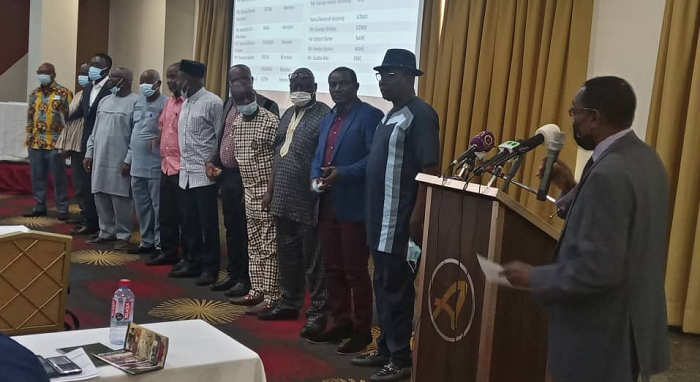
Forest Industries Association of Ghana launched
The Forest Industries Association of Ghana (FIAG), an umbrella body to champion the course of players in the timber and wood related business in the country has been formally lunched in Accra.
FIAG, which is made up of 10 timber trade associations that have operated independently over several decades in the past, seeks to strengthen the private forestry sector to respond appropriately to current challenges of climate change, sustainability of forestry resources and trends in global trade.
Advertisement
The association, which is barely two-years old, has Ghana Timber Millers Organisation (GTMO); Ghana Timber Association (GTA); Furniture and Wood Products Association of Ghana (FAWAG); Wood Workers Association of Ghana (WAG); Ghana Sawn Timber Sellers Association (GSTSA); Domestic Lumber Traders Association (DOLTA); Domestic Lumber Manufacturers Association of Ghana (DOLMAG); National Association of Handicraft Exporters (NAHE); Kumasi Wood Cluster (KWC); and Ghana Canoe Carvers Association (GCCA) as its membership.
Efforts
Speaking at the launch last Tuesday, June 29, 2021, the Deputy Minister of Lands and Natural Resources, Mr Benita Owusu Bio, said government was working to ensure the sustainability of the country’s forest cover.
He said, for instance that, through the Green Ghana project, whose launch saw the planting of about five million trees to shore up the country’s depleting forest cover, the Minister disclosed that the exercise would be scaled up to ensure that the country planted about 100 million trees by 2024.
For him, ensuring the sustainability of the country’s forest cover would help the players in the timber trade business continue to be in business, saying “As a private sector of forestry, the growth of your business certainly depends directly on the availability and supply of raw materials.”
Mr Bio noted that “The Government recognises the significant contribution of the wood industry and the potential of the sector to expand and generate additional revenue and employment, provided that the raw material supply base can be guaranteed and sustained.”
Support
He said the Ministry of Lands and Natural Resources through the Forest Investment Programme (FIP), had secured a seven million-dollar loan facility at a concessionary rate to stimulate private sector investment in small to medium scale commercial forest plantations.
In addition, he noted, the facility would be disbursed as part of measures to cushion the timber trade sector, hence encouraging the players in the sector to apply for the facility when it is advertised.
The launch which was on the theme: “The launch was on the theme: “Sustainability of the forest and forest trade in Ghana in light of global changes”, brought together players, regulators and other key stakeholders under one roof.
Appeal
The Chairman of FIAG, Mr Richard Nsenkyire, called on the government to create the enabling environment for forestry industry to thrive in the country, adding that the sector had created many job opportunities for the country’s populace.
He expressed concern about the difficulties players had in moving their cargo to and from the sea-ports since the Western rail lines collapsed.
“The total collapse of the western rail line has had a tremendous negative impact on the timber and wood product businesses,” he noted, adding “Movement of the annual 500,000 cubic meter of wood products exports have for over nearly three decades been by road, making delivery to the port slow and very expensive.”
Mr Nsenkyire has, therefore, appealed to the government to help resuscitate the western railway lines to help reduce the burden in transporting timber products in the country.
He also expressed worry that the over-regulation of the forestry industry was negatively impacting the business of players in the sector.
“Along the forest product supply chain, there is over-regulation of the business processes leading to bureaucratic bottlenecks and corruption, resulting in loss of revenue to state and high cost of doing business, he explained.
For him, there is the need to shorten the over-regulation processes by decentralising the regulatory bodies responsible for issuing permits.
Mr Nsenkyire also called on the government to review some of the forest and timber laws, particularly law on stumpage calculation, competitive bidding, and business operation registration “that are inimical to the growth of the industries.”
Rationale
The Chief Executive Officer of FIAG, Dr Kwame Asamoah Adam, touching on the rationale behind the formation of the association said, it would serve as a unified voice for players in the timber trade business in the country.
For him, the association, among others, had been formed to help players in the timber industry to operate responsibly by conducting business in accordance with modern best practices that also contribute to the UN Sustainable Development Goals (SDGs).




